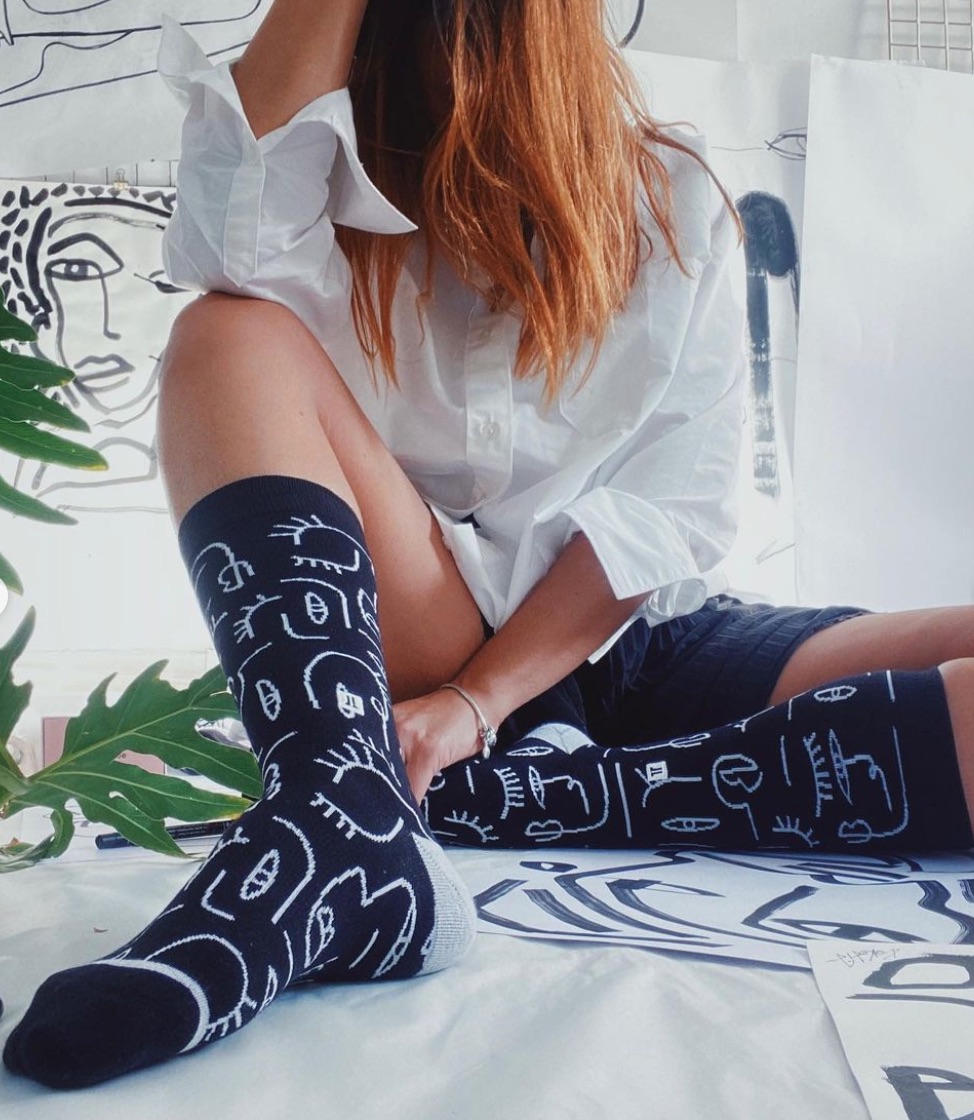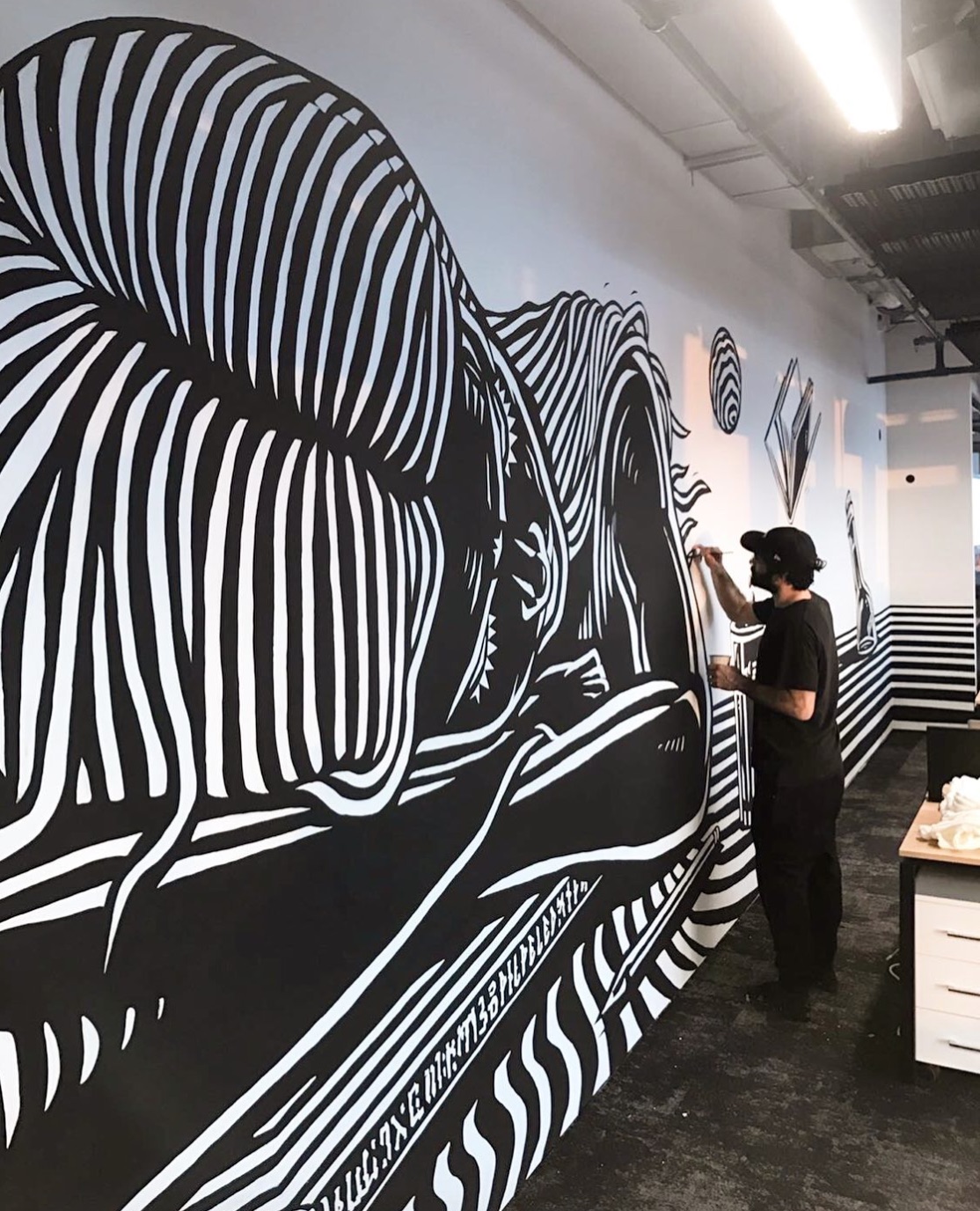If there’s one thing artists have learned, it’s that Instagram offers the perfect blank canvas. Particularly during a pandemic.
Israeli artist Shira Barzilay, better known online as Koketit, has been using the photo-sharing social networking platform to try out new ideas with her 306,000 followers.
Known for her coquettish line drawings that often focus on the female figure and female empowerment, Barzilay connects with many of her new clients through Instagram.
One of her latest clients is Collectoe, an Israeli sock company that weaves artists’ designs into their finely combed, cushioned, cotton crew-cut foot coverings.

Israeli artist Koketit collaborates with a wide range of brands and companies, including Collectoe, an Israeli brand that supports Israeli artists (Courtesy Shira Barzilay)
“I’m the artist and they’re the curators and instead of showing my art in a gallery, I’m showing it on a sock,” said Barzilay.
Collectoe wants to support the creative community, said product manager Metav Djemal, and collaborates with artists of all mediums, including digital, graphic, tattoo and graffiti creators, from Israel and around the world.
The artists are given a sock template and invited to go wild. Most end up with collections of two to four socks, and with every sale, receive a percentage of the profits.
“There’s a shift in the art world right now,” said Barzilay. “I’m not sure artists would otherwise have condescended to these ideas before. But times have changed.”
Some of the pivots and out-of-box thinking took place well before the arrival of the coronavirus. The pandemic — and Instagram — simply put them over the creative edge.

Artist Nir Peled, known as Pilpeled, painting wall murals in the offices of an Israeli high-tech company (Courtesy Pilpeled)
Barzilay’s male counterpart may be Nir Peled, known as Pilpeled, the artist whose signature look is the fantastical black-and-white, sometimes eerie images that he paints on sides of buildings or as wall murals in offices, restaurants and lobbies.
The coronavirus swept away a planned exhibit, and since its outbreak he has stopped getting jobs for large paintings on the sides of buildings, he says.
Instead, Peled turned to his 37,800 followers on Instagram. They quickly snatched up a final batch of black-and-white puzzles that he found in his storeroom — and begged for more. He couldn’t even respond to all the messages.
“I was on Instagram a lot,” said Peled. “There’s more communication there with my clients.”
The back-and-forth messaging with clients motivated Peled, and even snagged him a work trip to Turkey between lockdowns, where he painted a new wall mural.

The coronavirus-era bandannas of Israeli artist Pilpeled (Courtesy PilPeled)
He also came up with a new product, Pilpeled black-and-white bandannas, the perfect accessory for face-covering chic.
He’s waiting for a new batch to arrive, and in the meantime, clients keep asking where they can order one.
Even with the pivots and the commissions to paint murals in clients’ new home offices, Peled says what he misses most are the massive jobs, the side-of-buildings murals and over-the-top wall paintings.
“That’s what I really love doing,” said Peled.
The amount of time everyone has spent at home staring at their walls has helped inspire Artsource creators Sarah Peguine and Michal Freedman, who launched their online platform in 2018, selling and promoting Israeli contemporary art in English to local and foreign clients, well before the arrival of COVID-19.
But it was their frequent use and understanding of Facebook and Instagram that was their best marketing tool during the last 10 months.

Sarah Peguine, left, and Michal Freedman of Artsource, a platform for Israeli contemporary art in English. The two found that Instagram helped them keep their platform and artists relevant during the coronavirus pandemic (Courtesy Gal Houbara)
Peguine was an early adopter of Facebook and Instagram, said Freedman, one of the first in the Israeli art world to venture into social media, and with a blog as well. She has more than 20,000 followers on her personal Facebook page, and the two have 14,400 followers on the Artsource Instagram page.
The two women created their site to be a bridge between galleries, artists and clients, with a highly personalized service that literally brought artworks to clients, or offered video calls for closeup perusals when a client wasn’t located in Israel.
When the world went digital during the pandemic, Peguine and Freedman continued connecting everyone through their own content, Zoom calls, online studio visits and, of course, Instagram.
Clients weren’t traveling, and some had more resources to invest in their homes and art, said Peguine. They also wanted to support local artists.

Ceramic vases by artist Gur Inbar, now being represented by the Artsource platform, as part of its efforts to expand the definition of fine art (Courtesy Artsource)
Next month, the Artsource pair are launching a new platform, Handle with Care, an online shop for Israeli design, ceramics, jewelry, textiles and small pieces of furniture. The online shop draws on the growing international interest in Israeli design, offering objects that are smaller, more easily shipped and generally more affordable. That’s crucial for many clients who are often making their first major art purchase through the website.
“Fine art is the kind of thing you’d put on hold during this kind of time,” said Freedman, “but we wanted to do what we could for the art community. This offers other options.”
It was the coronavirus that pushed Barzilay to focus more on her own work. She was fired from her job at the start of the pandemic, and figured she had no choice but to finally pursue her art career.
The Shenkar-trained Barzilay, 38, has worked in fashion design and fashion illustration and started Koketit as her own line of artistic work, channeling the coquettish, flirty images that inspire her.

Artist Shira Barzilay, or Koketit, in one of the fashion collaboration pieces she has garnered during the COVID-19 pandemic (Courtesy Shira Barzilay)
“I’m [a] very girly girl, all about female empowerment,” she said, “My art is about processing my emotions. It’s my story, and I’m not trying to be objective.”
Barzilay often finds that her ideas, line drawings superimposed on a dreamy bathroom tub, or etched on a bunch of green grapes and then posted on Instagram, bring her clients. As she writes on each post, ”Adding my art to photos that inspire me // creating layers of creativity.”
Now she’s designing socks; collaborating with a Chinese clothing line; creating decorative iPhone cases; and adding her art to an app that decorates selfies, and to a line of raincoats. Her art will also be featured in the perfumed temporary tattoos created by Israeli company Amkiri, which are brushed on with scented ink.
“I love having my ideas translated to different contexts, and all these companies allow you to express yourself as an artist,” said Barzilay.

Food illustrator Sarit Atzitz found new work creating clients’ favorite family dishes when she posted sketches on her Instagram page (Courtesy Sarit Atzitz)
Food illustrator Sarit Atzitz had already successfully pivoted 10 years ago when she left a successful career in product design and wound her way into food illustration, without ever properly learning it as an art form.
But the 10 months of the coronavirus crisis have pushed her to go with the flow — and most importantly, to engage and actively involve her Instagram followers in what she creates.
While she was already working with major brands beforehand, creating an illustrated series for Nespresso’s new capsules and enlivening Yoplait’s fruit-flavored yogurts, it was the last ten months that pushed Atzitz to own her talent and dive fully into food illustration.
She created a food illustration course on Zoom, and her Instagram sketches of some favorite foods gave her an additional line of work illustrating clients’ favorite dishes as private commissions.
“It’s been a year that’s so empty and yet so full,” said Atzitz. “Every time I doubt myself, I tell myself, ‘Sarit, you’ll succeed. What’s the worst that will happen?'”
"artist" - Google News
January 17, 2021 at 05:22PM
https://ift.tt/39JGMbK
Pinched by pandemic, Israeli artists paint new paths onto Instagram walls - The Times of Israel
"artist" - Google News
https://ift.tt/2FwLdIu
Bagikan Berita Ini














0 Response to "Pinched by pandemic, Israeli artists paint new paths onto Instagram walls - The Times of Israel"
Post a Comment